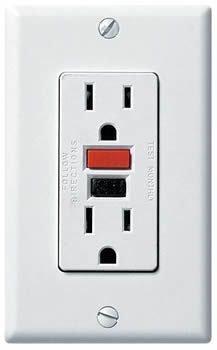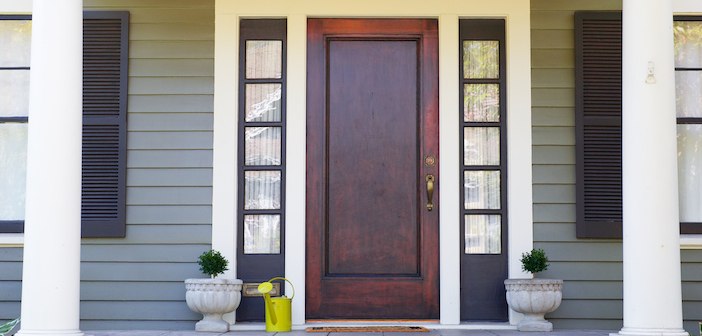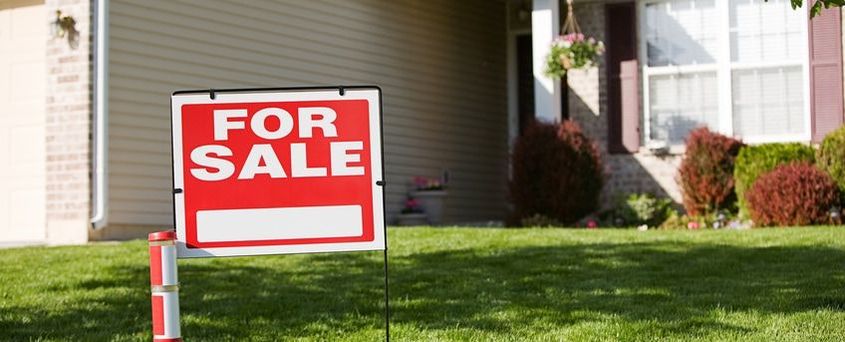 Ground Fault Circuit Interrupter GFCI's The outlets with the colored "Test" and "Reset" buttons are specially designed to better protect people than ordinary outlets. GFCI's have been used in houses since the 1970's. Why Are They Used? GFCI's are designed to shut power off if there is a very small leak of electricity (a ground fault) which ordinary outlets wouldn't notice. Normal outlets are shut off by a fuse or breaker if more than 15 amps flows. This prevents fires, but since people can be killed by 1 amp or less, fuses may not protect people from shock. GFCI's shut off power if a leak as small as .005 amp occurs. How Do They Work? A GFCI detects a leak by comparing how much electricity comes back through the white wire to how much was sent in the black wire. When everything is working correctly, the current flow is the same. If a little electricity is leaking out, it may be going through a ground wire or through part of the house. If this happens, the black wire will have more electricity than the white wire. Electricity, like most people, will follow the path of least resistance. If a person touches a leaky electrical system, they may present a better route to ground for electricity, since they may offer very little resistance. Another way of saying this, is that the person may be a very good conductor or the person may not be well insulated. The electricity will flow through the person, giving them a shock. Without a GFCI, this can be fatal. With a GFCI, the little leak would be detected and the power would be shut off. Where Are They Used? GFCI's are now required by Code for outdoor outlets, bathroom outlets and whirlpool outlets. Electrical systems for swimming pools are also GFCI protected. Kitchen outlets within six feet of the sink must also be GFCI protected. Can The Outlet Be GFCI Protected If There Is No Button? Yes, if for example, the circuit breaker back at the panel has a "Test" button, it is a GFCI breaker. This will protect everything on that particular circuit. Any outlets wired downstream of a GFCI outlet are also protected if the GFCI is wired correctly. Can They Be Added To Older Houses? Yes, GFCI's can be added to any electrical system. They are more expensive than regular outlets ($15-$20 vs. $1-$2), but are inexpensive insurance. While they do not replace grounding systems exactly, some Codes do allow GFCI's in lieu of grounding in some cases. It is safe to say that a circuit protected by a GFCI is better protected than one without. Contents of this site Copyright 2015/2016 Carson, Dunlop & Associates Ltd. All rights reserved. No text or graphical material may be copied from this site without the express written permission of Carson, Dunlop & Associates Ltd. Line drawings are from the Carson Dunlop Home Inspection Training Program and Home Inspection Software Tool - Horizon
0 Comments
 In our household, we have a ZERO TOLERANCE POLICY for lying. In fact, we have a motto that we say to each other often to remind us. "Lying is dangerous." We believe that once you start being dishonest about little things, it gets harder and harder to be honest about the big things. So here's what that has to do with you as you read this. I'm going to tell you the truth, the hardest truth a good home inspector has to tell. You ready? I miss some things. *Yuck!* That feels awful to put into type. No matter how unpleasant it is to admit, though, it is true. When I go through I house, I aim to be as thorough as I can be. I try to poke into corners and dark places that you'll likely never see as long as you live in your home. I try to test everything I can to make sure that when I give you the report, you have all of the info you need. But I'm only in the house for a maximum of 6 hours. You'll be living there for years, so there's a pretty good chance that eventually you'll find something that I couldn't. Any good home inspector can confidently tell you that they work hard and study often to make sure they are doing their very best for you. Any good home inspector should also be able to admit that they might miss something. I've only ever been called about 3 things that were perceived as misses. They were all little things and were all easily remedied. I never have a problem taking responsibility if there's something that I should have caught. Make sure the same is true for your inspector. When you are calling around asking for prices, ask them about how they handle misses. It's a touchy subject for sure, because we live in a litigious society that likes to get as much as possible out of every mistake. We're regularly reminded of the dangers of taking responsibility when we see so many lawsuits rolling around. Nevertheless, misses happen and you should know that your inspector is prepared to help when needed. Here's another honest statement for you, one that's much more comfortable for me to make. I will work hard and study hard to ensure that I am being thorough and knowledgeable and accurate. I will give you the very best report that I feel is possible. I won't cut corners, and I will gladly have an honest talk with you if ever you feel I have missed something. That's a conversation I hope we won't ever need to have, but if it comes up, I'll shoot straight with you. Want to know how you can avoid misses on your inspection? Follow these tips to get the very best information possible: 1. Follow your inspector through the inspection. It may make the inspection take longer, but you'll get to see everything your inspector sees in real time. 2. Ask any questions you have. Don't be shy about sounding uninformed or pesky. A silly little question could lead to a big revelation. 3. Check reviews and professional credentials/trade affiliations on your inspector. A good reputation will typically follow a good inspector. 4. Find out if your inspector does rechecks or callbacks and if there's a charge. We don't believe in charging a second fee to come back out and double check something, even if it's not a miss. You already paid for the info, shouldn't you get all of it? 5. Ask for references. It's an old fashioned thing that we used to do all the time, and it's still a good practice. Don't hesitate to reach out to us if you have questions about an upcoming home inspection or if you want more brutal honesty. I'm always happy to help in any way I can. Home inspections have traditionally been for the benefit of the purchaser. Pre-inspected listings benefit all parties - purchasers, vendors and Realtors.
Deals Won't Fall Through Home inspections, performed as a condition of the offer, can kill deals. Sometimes this is because the purchaser gets cold feet; sometimes there's a big problem no one knew about. Sometimes it is because the house has been misrepresented; sometimes it is because the home inspector scared the purchasers by not explaining that minor and typical problems are just that - minor and typical. If the home inspection is performed prior to the house being listed, all parties will be aware of the physical condition of the house before an offer is drawn. There will be no surprises after the fact. Deals will not fall through. Pre-inspected Listings Avoid Renegotiation In a buyers' market, most houses have to be sold twice. It takes a lot of work to get a signed Agreement of Purchase and Sale. Then the home inspection is done and the purchaser wants to renegotiate. If all parties know the condition of the house prior to the offer, there is no need for renegotiation. As most real estate agents know, renegotiation is very difficult. Vendors have already mentally sold the house; purchasers are suffering buyers' remorse. Egos, pride and frustration can muddy the already emotional waters. A vendor who pays for a home inspection will be further ahead than one who has to renegotiate. He of she may even sell the house faster. Unrealistic Vendors An inspection at the time of listing can also help a Realtor deal with a vendor who has unrealistic expectations. The inspection report is good ammunition for explaining why you can't ask top bucks for a house which is not in top condition. Repairs Prior To Sale Sometimes, the home inspection will reveal items which should be repaired immediately. A pre-inspected listing allows the vendor to repair the problem prior to putting the house on the market. If the inspection occurs after the Agreement of Purchase and Sale, the purchaser could walk, renegotiate or, depending on the inspection clause, the vendor may have the option to repair. A repair done by an unmotivated vendor may not be the best repair and may not meet the purchasers' expectations. This has caused more than one deal not to close. Peace Of Mind For The Purchaser There is no doubt that part of the value of a home inspection is a guided tour of the house for the prospective purchaser. The inspection company can return to do a walk-through with the purchaser, if requested. Reputable Inspection Companies Pre-inspected listings will only have value if the home inspection company is perceived to be reputable, qualified and properly insured. Prospective purchasers will have little or no faith in a report done by someone they perceive to be in the vendors', or Realtors' pocket. Contents of this site Copyright 2015/2016 Carson, Dunlop & Associates Ltd. All rights reserved. No text or graphical material may be copied from this site without the express written permission of Carson, Dunlop & Associates Ltd. Line drawings are from the Carson Dunlop Home Inspection Training Programand Home Inspection Software Tool - Horizon New houses and old houses are different in some important ways, and they are the same in some important ways. They both suffer from some of the same problems. To illustrate this, we reviewed literally all of the inspections we have ever done looking for patterns. We found the top five issues that show up in reports from new and old houses alike. If you want a heads up on what we'll find when we get to your place, here's a great place to start.
1.) Downspouts (89%)- By far our biggest offender, short downspouts showed up in almost 9 out of 10 inspections. It didn't matter how new or old the property was. When downspouts discharge directly at the foundation of a building, water is able to wash away the backfill (a less dense soil often mixed with sand or gravel) that sits against the foundation. This can cause exaggerated settling on the corners of the house where the majority of the weight sits. Downspouts extensions are not expensive or difficult to install. All downspouts should end about 6 feet from the foundation. We'd be willing to bet that yours are too short as well. Take this weekend to fix that. You'll be glad you did. 2.) Non-GFCI Outlets (71.5%)- This is another really common issue showing up on almost 3 of 4 reports. GFCI outlets are the receptacles with the "Test" and "Reset" buttons in the center. The purpose of these outlets is to stop the flow of electricity to the outlet if water is detected. This is to prevent you from accidentally becoming the electrical ground, which we guarantee would ruin your day. GFCI outlets should be installed anywhere moisture is present like kitchen counters, bathrooms, behind washing machines, and even under the kitchen sink where the garbage disposal plugs in (some electricians will debate this last one, but we choose to err on the side of not getting electrified). These outlets are not expensive and only take a few minutes to install. You can do it during a commercial break. 3.) Low Insulation (59%)- This is one issue that seems to show up a little more on older houses than newer ones. Insulation compacts over time which reduces its effectiveness. Plus, we're always getting better at insulation. A hundred years ago, we thought a few inches of wood shavings was good insulation. We now know that a few inches of wood shavings is really only good for starting fires. Even new houses suffer from low insulation, though. Adding insulation doesn't have to be time consuming or expensive if you're willing to take a stab at it yourself. The machines can be rented from most home improvement stores where you can also buy the insulation. The whole job takes about 2 hours for a 1600 Sq Ft house. You can read up on different materials and recommended depths for your type of furnace and temperate zone in this nifty article. If you want to check out the process for adding the insulation material you've chosen, you can watch this video to get some helpful advice from our friends at This Old House™. 4.) Trees / Shrubs (54.5%)- Homeowners love the way landscaping helps homes feel nestled into their setting. For generations, we've known that trees are great energy savers during the summer months as they offer cooling shade. People have planted yew bushes against their walls for decades, because they're low maintenance and produce some easy-to-keep greenery along the bottoms of walls. However, when these lovely plants are not watched carefully and trimmed faithfully, they will eat your house. No really, it's bad. Tree branches will scrape granules off of your roof, roots will push against foundations and crack drain pipes, and yew bushes will grow into behemoths that can hold 50 gallons of water in their root systems directly against your house. Trees and shrubs will benefit your house the most when trimmed back regularly. Trust us, it's really worth the time and expense. A good rule of thumb is to allow at least two feet between all plants and walls, but more space is better. Snip snip! 5.) Fireplace / Firebox (51%)- There was a time in our history, many moons ago, when the fireplace was a significant method of heating our homes. While a few people still keep their toes toasty with them, fireplaces are generally a nostalgic, cosmetic feature now. We've largely forgotten how to properly care for this really important part of the house. As a result, we see a lot of cracked masonry or rusted fireboxes. Just over half of our reports had issues with the fireplace, which is notable because only about 70% of the houses we inspect have a fireplace at all. There's some math out there that would show just how those numbers coincide to make an important statement, but math isn't our specialty. Just know that if you've got a fireplace and you've never had it serviced, you probably should. There are plenty of other issues that new and old houses share, but our unbiased scientific calculations show that these are the main ones. If you own a home, you owe it to yourself to tend to these little things before they become big things. We're always happy to answer your questions, too. Call us any time to talk about what your house might need from you.  We specialize in old houses, but what does that mean for you as a buyer, seller, or realtor? We thought we might answer some of our more commonly asked questions about this. Do you only inspect old houses? No, of course not. While our disciplinary focus is on older or historic homes, we can offer thorough and reliable info on homes of any age. While we do extra study to gain an in-depth knowledge of older homes, about a third of our inspections are performed on homes younger than 50 years. Are you the best inspector around for old houses? We don't get into comparisons, because we have a deep respect for many of the other home inspectors in our area. What we can say is that we read old houses in a different way than many inspectors. Our company is owned by a lifetime old-home enthusiast who serves on the board of a local preservation group, so our focus is on knowing and teaching about old homes. Other inspectors charge more for old houses. Are you in it for the money? It's true that many inspectors charge an additional premium for any house over 50 years old. We don't. In fact our pricing doesn't rely on square footage, age, or physical features. We have tried to make our pricing as simple and direct as possible. You don't have to call us for a quote. We post all of our prices right on our web page. If you're into old houses so much, why should you inspect my new house? We happen to know a lady who is great at baking desserts (she's the boss's wife). She specializes in pies, but her cakes are amazing, too. Being really good at one thing doesn't mean you're not also really good at the next thing. We are good at inspecting houses, old and new. You can trust that we're going to be dedicated, thorough, and experienced whether your house was built in the Victorian Era or during the Digital Revolution. Here's what you really need to know. We love houses, all of them. And we love helping you understand the function and care of your house. You want to feel confident that you picked the right place. We can help make that happen. |
AuthorMatt loves houses, new and old. But if he had to pick, he'd pick the old. Archives
June 2017
topics
|



 RSS Feed
RSS Feed